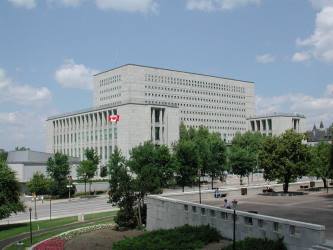
Highlights from November 2012 Pan-Canadian Documentary Heritage Network Forum
December 16, 2012
Canadian Library Association (CLA) Executive Council members President Karen Adams, President-Elect Pilar Martinez and Councillor Jennifer Evans participated in Library and Archives Canada’s (LAC) Pan-Canadian Documentary Heritage Network (PCDHN) forum on November 5-6, continuing on our path of constructive engagement with LAC.
Presentations and discussions revolved around shared challenges and finding shared solutions amongst forum participants. Copyright, digital preservation and access, discoverability, changing user expectations and behaviours, innovative approaches, the end of LAC inter-library loan service were all part of the discussions. Forum participants remain committed to on-going communication and collaboration.
CLA is actively participating in PCDHN sub-groups focused on the National Union Catalogue and Inter-Library Loan. Updates on the work of these groups will be made available to CLA members as soon as information is available.
Canada’s 150th anniversary in 2017 is one opportunity for the community to work together in building Canadian stories and content. Jennifer Evans will take the lead for CLA on this forum initiative.
Highlights from LAC’s Report on PCDHN forum
Summary
During the November 5 to 6, 2012 Pan-Canadian Documentary Heritage Forum in Ottawa, participants agreed that successful collaboration and collective action depends largely on open communication and broad sharing of information across the documentary heritage communities in Canada. The network is an ecosystem where members have diverse but complementary mandates. While these frequently intersect on shared issues, respect for and understanding of each other’s mandates are important factors for success. The readiness and level of engagement vary across members of the network, and multilateral and bilateral arrangements can be used to deliver results in the shorter term where mutual benefits to participants are clear. Lastly, participants underscored that the network is strengthened by convergence between the communities, and by the diversity of various perspectives.
Key points
- The mandates of network members are diverse and organizations must focus on their own legislative requirements first and foremost.
- A change in methodology or technique does not necessarily mean a change in core values or principles, but rather that programs and services are being updated as needs and expectations evolve.
- Initiatives undertaken to date, demonstrate that sharing information is the key to strong partnerships.
- Increased convergence between Canada’s documentary heritage communities is advantageous, and better responds to client needs.
- Healthy collaboration and collective action demands respect and good communications, as well as clear objectives and benefits for all partners.
- Shared issues, like copyright reform, impact all network members and provide avenues for constructive dialogue that crosses community boundaries. Joint initiatives, like training to improve the ability of practitioners to interpret the Copyright Act, would support the documentary heritage community to increase digitization of collections.
- Institutions across Canada are:
- Looking for solutions to provide greater access to content while balancing client needs and expectations as well as the rights of donors and creators;
- Finding opportunities to work alongside other heritage organizations to develop solutions to common challenges;
- Pushing program and service innovation to foster employee learning and growth, and to develop new employee skills and competencies;
- Developing new approaches to their business and finding that employees are engaged when they understand why changes are being made;
- Innovating to become more client-focused, and assessing related changes to determine returns on investment;
- Reviewing more traditional approaches and assumptions, and seeking alignment with other established frameworks outside of the documentary heritage domain;
- Engaging sponsors and fundraisers to augment public resources with private sector investment.
Opportunities for collaboration and collective action
- The 150th anniversary of Confederation in 2017;
- Digitization and digital content strategies, including systems and platforms, copyright, etc.
Next steps
- Create a Web-based collaborative workspace to share meeting documentation;
- Develop a summary with key findings from the event, to foster information sharing;
- Distribute a list of event participants;
- Share Library and Archives Canada’s organizational chart and key contact information;
- Convene a Canada 150 Working Group for preliminary discussion;
- Establish a process for collaborative agenda-setting for future meetings.
Add a new comment